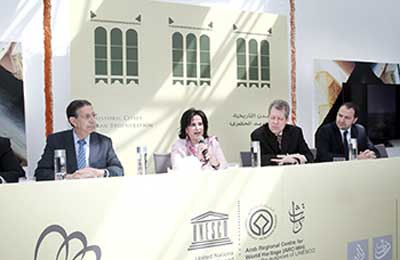
Officials at the conference
Bahrain experts to help restore ruined historical sites
MANAMA, March 24, 2015
Ruined historical and cultures sites across the Middle East are being restored by a team of Bahrain-based experts.
The Arab Regional Centre for World Heritage (ARC-WH) has signed an agreement with the Yemeni Culture Ministry to help preserve Zabid, a historic city that has been listed as a world heritage site in danger by Unesco, said a report in the Gulf Daily News (GDN), our sister publication.
It has also sent teams to Libya and Syria, and plans to travel to Iraq next month following the destruction of religious shrines and cultural sites by Islamic State (IS) militants.
"An agreement was signed for the historic city Zabid, which was put on the world heritage list in danger," centre director Dr Mounir Bouchenaki told the GDN yesterday.
"It had been under close observation by the World Heritage Committee to be taken off the list.
"This would've been a loss for heritage in the Arab countries as it's important because of its architecture, but it's also the city where algebra was discovered.
"So the centre sent a technical mission, prepared a project and despite the situation in Yemen we are still continuing."
Dr Bouchenaki was speaking on the sidelines of the opening of the Historic Cities and Urban Regeneration Conference, taking place at the ARC-WH, near Bahrain National Museum.
"We have also started to work with the Iraqis. I am going to Irbil next month to chair a training session," he said.
"We are also working very closely with the Syrians.
"In December, we were able to bring 22 Syrians who were directors of museums, sites and archaeological places to Beirut for a two-week training course.
"Beirut was closer for them and it was cheaper for us to take them to the Unesco office in Beirut rather than bring them to Bahrain.
"Libya is my next target."
Dr Bouchenaki added that the centre was in talks with Bahraini authorities to preserve Bahrain Fort - the country's first Unesco world heritage site.
"It's very important to maintain the environment of this monument for the future generations," he explained.
"Archaeologists want to have a kind of reserve for future generations because technology is improving and we can learn more and more about the history of this island which is absolutely incredible."
Meanwhile, ATHAR Regional Conservation Centre director Dr Zaki Aslan said it was important for Arab countries to plan for emergencies that could destroy historical sites, such as conflicts and natural disasters.
"Practically, we have inadequate planning towards risks in general, be it conflict or natural disasters," he told the GDN.
"In the planning work we do in historic areas, we don't have the integrated conservation approach and the risk preparedness approach.
"We also lack the community engagement and what we call the living heritage approach.
"We need to prepare risk management plans and in doing that we, the culture heritage people, should co-operate with other entitles.
"We need to work with civil society, civil defence, we need to work sometimes with the police and at one point, during wars, with the army.
"We need to prepare this mechanism of co-ordination because we have proved that we're not as well prepared as in Europe and North America for example."
The conference, which will end on Wednesday, will hold daily workshops and seminars with experts on topics that include historic cities at risk and new approaches to urban conservation. - TradeArabia News Service







